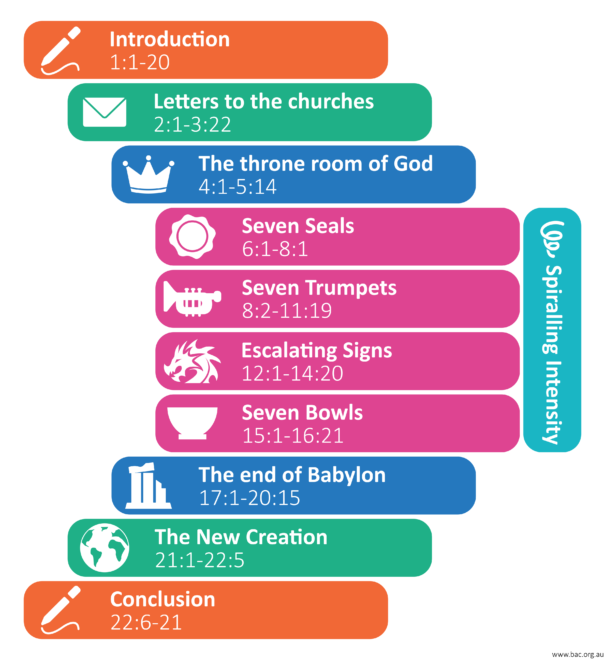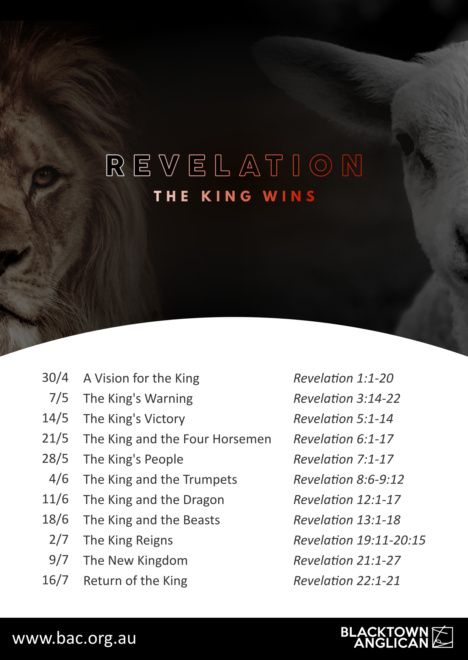Overview
Revelation is all about Jesus. He is God’s anointed King. The King who wins.
One major aspect that can make Revelation difficult for modern readers is quite simple: we aren’t very familiar with our Old Testament. The pages of Revelation are filled with quotations, allusions, images and expectations that draw upon the wealth of Old Testament teaching and prophecy. But those are often the parts of the Bible that modern readers are least familiar with. And so we get lost in the strange talk of trumpets and horsemen, temples and tribulation.
There are many who love to explore the symbolism of Revelation and attempt to decipher the mystery, often with wild ideas and conspiracies. But also often without reference to the background of Old Testament passages that lie behind Revelation.
In some ways, Revelation says far less than we may first imagine. In many ways, Revelation simply echoes the Israelite expectations expressed in the Old Testament. Of course, there is one significant difference: it is written after the life, death and resurrection of Jesus. As such, Revelation can show the fulfilment of many of God’s promises in Christ. It can show a more complete picture of God’s justice and mercy. And it can give us incredible assurance for what is yet to come.
Jesus is the king who wins. That’s the story of Revelation. That’s the powerful comfort that John’s first readers would have felt. And Christians in every age can know that same comfort in the midst of hardship, suffering and persecution. One day Jesus will return as the crowned and victorious king.
Revelation is all about Jesus.
Four ways to read Revelation
There have traditionally been four main ways of approaching the book of Revelation. Each view has a significant impact on how it understands some of the key aspects of Revelation. We have kept the classical terms used to describe these four views.

1. Preterist
This view sees the book of Revelation as primarily speaking about the past. Most of the events described are attributed to the time of the early church after the resurrection of Jesus, including the time that John is writing this book.
This view sees Revelation more as a document of history, and less about the present or future.
2. Historicist
This view attempts to view Revelation as an unfolding series of events that can be mapped to the powerful empires of human history. It views Revelation as a kind of timetable of events, and seeks to connect the story of Revelation to real events in human history.
This view has become less popular over time, especially as there has been great disagreement between those who hold this view as to which particular events of history are referenced in Revelation.
For example, the beast/antichrist in Revelation has been variously identified as the Pope, Napoleon and Hitler. The fact that interpretation has regularly changed as history continues, as well as it typically being limited to the Western world, together make this an unsatisfying view.
3. Futurist
This view sees Revelation as primarily speaking about the future. Most of what is described has not yet taken place. As such, it had minimal direct application for John’s original audience.
This view typically downplays the symbolism in the book, and takes a more literal stance to what is described.
4. Idealist
This view understands Revelation as describing patterns of history, rather than specific events. Revelation describes the repeating patterns of human sin, and God’s judgement & salvation that are seen throughout history. The truth of Revelation may be found in every age of humanity.
This view sees Revelation as a timeless message, relevant to people across history. It focuses especially on the symbolism of the book, rather than looking to connect it to specific events.
The fact that those who have previously taken a Historicist perspective have often disagreed on which particular events in history align to the details of Revelation supports an Idealist view that Revelation tells the story that has repeated time and again throughout history. Further, the Idealist view does not dismiss some of the implications for John’s immediate context, nor some of the future-oriented events.
For these reasons, we generally take an Idealist position where we believe it provides an important lens to understand Revelation.
Structure
Revelation is not a neat book in how it is structured. In fact, there are many ways that commentators have found the book could be divided up. However, there can be observed a broad momentum that builds throughout the book. The central chapters can be seen as a spiralling drama of increasing intensity, before culminating in the final judgement and the new creation.

Sermon Series
While we won’t be preaching on every chapter of Revelation, we will endeavour to touch on some of the key themes and movements in the chapters that we will be passing over. And of course, this online resource has notes for every chapter.
Here is a guide to the dates and passages for the series:
